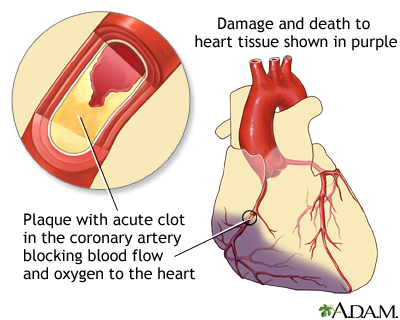Heart attack - what to ask your doctor
What to ask your provider about your heart attack
A heart attack occurs when blood flow to a part of your heart muscle is blocked for a period of time and an area of the heart muscle is damaged. It is also called a myocardial infarction (MI).
Angina is pain or pressure in the chest. It occurs when your heart muscle is not getting enough blood or oxygen. You may feel angina in your neck or jaw. Sometimes you may notice that you are short of breath.
Below are some questions you may want to ask your health care provider to help you take care of yourself after a heart attack.

A heart attack or acute myocardial infarction (MI) occurs when one of the arteries that supplies the heart muscle becomes blocked. Blockage may be caused by spasm of the artery or by atherosclerosis with acute clot formation. The blockage results in damaged tissue and a permanent loss of contraction of this portion of the heart muscle.
Questions
What are the signs and symptoms that I am having angina? Will I always have the same symptoms?
- What are the activities that can cause me to have angina?
- How should I treat my chest pain or angina when it happens?
- When should I call the provider?
- When should I call 911 or the local emergency number?
How much activity is OK for me?
- Can I walk around the house? Is it OK to go up and down stairs? When can I start light housework or cooking? How much can I lift or carry? How much sleep do I need?
- Which activities are better to start with? Are there activities that are not safe for me?
- Is it safe for me to exercise on my own? Should I exercise inside or outside?
- How long and how hard can I exercise?
Do I need to have a stress test? Do I need to go to a cardiac rehabilitation program?
When can I return to work? Are there limits on what I can do at work?
What should I do if I feel sad or very worried about my heart disease?
How can I change the way I live to make my heart healthier?
- What is a heart-healthy diet? Is it OK to ever eat something that is not heart healthy? How can I make heart-healthy choices when I go eat out?
- Is it OK to drink alcohol? How much?
- Is it OK to be around other people who are smoking?
- Is my blood pressure normal?
- What is my cholesterol? Do l need to take medicines for it?
Is it OK to be sexually active? Is it safe to use sildenafil (Viagra), vardenafil (Levitra), or tadalafil (Cialis) for erection problems?
What medicines am I taking to treat angina?
- Do they have any side effects?
- What should I do if I miss a dose?
- Is it ever safe to stop taking any of these medicines on my own?
If I am taking a blood thinner such as aspirin, clopidogrel (Plavix), prasugrel (Effient), ticagrelor (Brilinta), coumadin (Warfarin), apixaban (Eliquis), rivaroxaban (Xeralto), edoxaban (Savaysa), dabigatran (Pradaxa), can I use medicines such as ibuprofen (Advil, Motrin), naproxen (Aleve, Naprosyn) for arthritis, headaches, or other pain problems?
References
Anderson JL, Fang JC. ST segment elevation acute myocardial infarction and complications of myocardial infarction. In: Goldman L, Schafer AI, eds. Goldman-Cecil Medicine. 26th ed. Philadelphia, PA: Elsevier; 2020:chap 64.
Giugliano RP, Braunwald E. Non-ST elevation acute coronary syndromes. In: Libby P, Bonow RO, Mann DL, Tomaselli GF, Bhatt DL, Solomon SD, eds. Braunwald's Heart Disease: A Textbook of Cardiovascular Medicine.12th ed. Philadelphia, PA: Elsevier; 2022:chap 39.
Morrow DA, de Lemos JA. Stable ischemic heart disease. In: Libby P, Bonow RO, Mann DL, Tomaselli GF, Bhatt DL, Solomon SD, eds. Braunwald's Heart Disease: A Textbook of Cardiovascular Medicine.12th ed. Philadelphia, PA: Elsevier; 2022:chap 40.
Smith Jr SC, Benjamin EJ, Bonow RO, et al. AHA/ACCF secondary prevention and risk reduction therapy for patients with coronary and other atherosclerotic vascular disease: 2011 update: a guideline from the American Heart Association and American College of Cardiology Foundation endorsed by the World Heart Federation and the Preventive Cardiovascular Nurses Association. J Am Coll Cardiol. 2011;58(23):2432-2446. PMID: 22055990
Version Info
Last reviewed on: 1/1/2023
Reviewed by: Michael A. Chen, MD, PhD, Associate Professor of Medicine, Division of Cardiology, Harborview Medical Center, University of Washington Medical School, Seattle, WA. Also reviewed by David C. Dugdale, MD, Medical Director, Brenda Conaway, Editorial Director, and the A.D.A.M. Editorial team.
